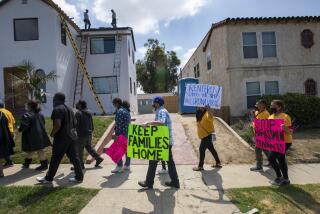L.A. Group Provides Free Legal Help for AIDS Victims
Not only are AIDS victims fighting for their lives, they are battling to keep their apartments and insurance benefits when they become too sick to work. Now a group of attorneys is there to help, free of charge.
Hundreds of young people who never gave a thought to drawing up a will have come down with AIDS and suddenly find they have little time left. They must put their affairs in order before they die.
Over the last eight months, the Hospice/AIDS Program of the Los Angeles County Bar Assn. has trained 140 lawyers willing to donate their legal skills to AIDS patients, said Cindy Raisch, director of the program.
Raisch said the Bar Assn., aware of the growing hospice movement in California, first began training volunteer attorneys to help the dying in hospices in 1984. During all of 1985, she said, only 50 calls were received.
Training Expanded
At the urging of AIDS Project Los Angeles, the training was expanded in August, 1986, to attend to the needs of AIDS patients, she said. In the first two months, 50 AIDS patients requested legal help, Raisch said.
As of late April, she said the Hospice/AIDS program has filled about 280 requests for legal assistance, she said.
“We saw that there was a hospice movement to allow people to die with dignity,” Raisch said. “Attorneys can play a role by making a person’s passing as smooth as possible.”
Raisch said most AIDS victims call the Hospice/AIDS program upon a referral from AIDS Project Los Angeles, which provides a wide variety of services to AIDS patients.
Trained counselors at the association link patients with attorneys who will visit them at home or in the hospital if they are too ill to drive, Raisch said.
“We guarantee at least five hours of free legal help,” Raisch said. “Many of our attorneys, I know, have drawn up conservatorships without charge and that takes longer. We try to prevent our attorneys from becoming burned out, but many have gone far beyond the five hours.”
Legal problems common to AIDS patients too sick to work include negotiating with a landlord to delay eviction once they have run out of rent money, handling other creditors and assuring that they get the insurance and government benefits to which they are entitled.
More to Read
Sign up for Essential California
The most important California stories and recommendations in your inbox every morning.
You may occasionally receive promotional content from the Los Angeles Times.










